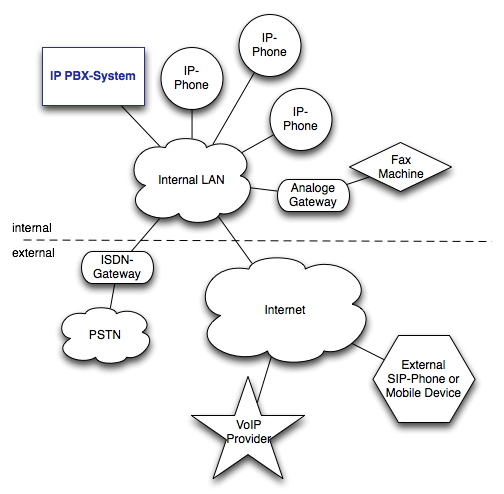PBX stands for Private Branch Exchange, which is a private telephone network used within a company or organization. The users of the PBX phone system can communicate within their company or organization and the outside world, using different communication channels like Voice over IP, ISDN or analog. A PBX also allows you to have more phones than physical phone lines (PSTN) and allows free calls between users. It also provides features like transfers, voicemail, call recording, interactive voice menus (IVRs) and ACD call queues.
PBX phone systems are available as Hosted or Virtual solutions (sometimes also called Centrix), and as inhouse solutions to be used on your own hardware.
PBX phone systems are usually much more flexible than proprietary systems, as they are using open standards and interfaces. Modern PBX phone systems are based on standard hardware, which is cheaper and can easier be replaced than a closed systems.
Switching to an IP PBX offers many benefits
With an IP phone system all your internal telephony is routed through the existing LAN (local computer network). This way a separate network for telephony is not required. Even though the internal telephony is routed through the LAN, it is also possible to connect your IP-PBX via gateways to the PSTN. Of course, VoIP (Voice over IP, telephony via the internet) is also possible.
Since IP telephony is mostly using the open SIP standard, an IP phone system gives you a lot more freedom in your choice of phones. Basically any SIP compatible phone (VoIP phone) will work with an IP PBX. Furthermore an IP PBX doesn’t limit the growth of a company. Since VoIP phones don’t have to be connected physically to the phone system, it doesn’t require a free port in the phone system like it used to be with traditional phone systems. IP phones can not only be connected via the LAN but also via the internet, using for example a VPN connection. Because of this, multiple locations and offices can easily be connected.
There is a huge variety of VoIP providers on the internet which provide SIP trunking (telephony services) for cheaper call rates than traditional telephony providers. Internal calls via an IP phone system are free general.
Practical advantages of IP telephony
Interconnecting teams and mobile working is one of the huge advantages of IP phone systems. No matter if team members are on the road, are located in a different country or work from home, they can connect via IP desk phone, smart phone or laptop to the PBX in the office. This way all calls within the company are free and clients will not realize if en employee is in the office or somewhere else around the world. The same also applies for conferences, these can be hosted directly on the own IP PBX with as many participants as required. This safes traveling time and money.
AskoziaPBX is a great example for an IP PBX system.



